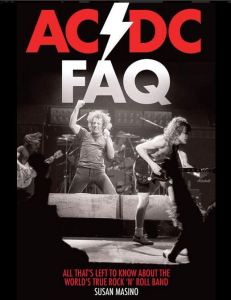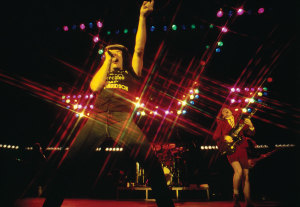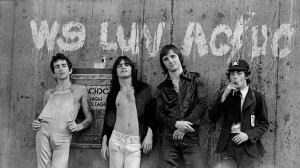AC/DC biographer Susan Masino, also a longtime band friend, is perhaps the only writer to enjoy the honor of an actual shout-out in one of the band’s early tunes. (See below.) If that doesn’t give a biographer cred, nothing does.
Masino’s Let There Be Rock: The Story of AC/DC is the band’s definitive biography, but there’s always more to tell with AC/DC. Her stellar, brand new AC/DC FAQ: All That’s Left to Know About the World’s True Rock ‘N’ Roll Band is jam-packed with even more stories, behind-the-scenes hi-jinx, and tasty bits from the band’s long way to the top. We caught up with Masino to get her take on the secret of AC/DC’s forty-years-and-counting success.
Dirty Deeds is my favorite AC/DC record. What’s yours?
Mine is Powerage for several reasons, aside from how brilliant all the songs are. I was in constant contact with Barry Taylor (roadie for the band), while they were in the studio. I actually mailed them copies of the interview I did with them the prior December (1977), when they played in Milwaukee, WI. My friend Barry kept bringing up the fact that he “helped” Bon with some of the lyrics. I thought that was nice, but it wasn’t until much later that I realized Bon used my name in the song, “Down Payment Blues.”
Whoa! You’re Suzy baby?
Well, I’d like to think I was one of them. I’m sure Bon knew other Suzys, but he also liked to tease Barry about his affection toward me. If he was referring to me, that is the most awesome thing an AC/DC fan can achieve, along with making it onto the Jumbo Tron when they played Milwaukee in 2010.
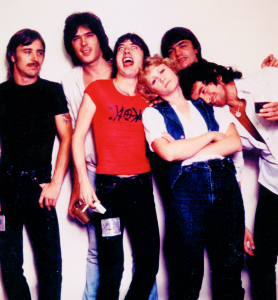 You go back with the band over thirty years. Give us a quick primer to your history with AC/DC.
You go back with the band over thirty years. Give us a quick primer to your history with AC/DC.
I was lucky enough to meet AC/DC on the first leg of their first U.S. It was August 16, 1977, and I was writing for a local paper here in Madison, WI. I was sent to the club to help out the promoter, and fell in love with the band. I became friends with Barry and he wrote and called me every week for the next three years. He left the band in 1980, right before Bon’s death, and I stayed in touch with the band over the past 38 years, seeing them on tour and writing two books about them.
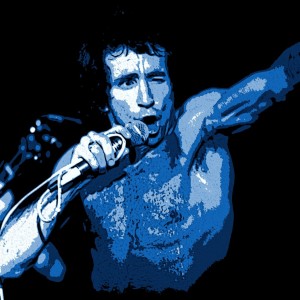 Some lumped AC/DC in as punk when they first began and you mention that Bon might have been influential to the early punk movement.
Some lumped AC/DC in as punk when they first began and you mention that Bon might have been influential to the early punk movement.
I know during their first tour of the UK, the Sex Pistols were on their way up and the band claimed that once they (the Pistols) saw AC/DC, they started dressing like Bon with the cut off denim jackets. AC/DC hated being called a punk band, and didn’t care for the music themselves at all.
 Is there any band that AC/DC didn’t blow off the stage?
Is there any band that AC/DC didn’t blow off the stage?
Absolutely not! To be fair, when they were opening for bands like Aerosmith, UFO, and Cheap Trick, I chose to stay backstage after the band was done playing. Once you saw AC/DC live, you were good.
I’d never heard there was a canceled cover for Highway to Hell. What exactly was the original supposed to look like?
It was supposed to be the band sitting in the backseat of a car, with the devil behind the wheel staring at them through the rearview mirror. But the record company didn’t want the band to call the album Highway To Hell and they weren’t having anything to do with a picture of a devil driving them in a car. After all these years, they’re still defending that title.
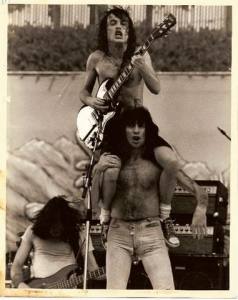 I grew up in the Bible Belt and preachers used to rail against AC/DC for singing with no small measure of enthusiasm about being on the highway to hell. What were they talking about, really?
I grew up in the Bible Belt and preachers used to rail against AC/DC for singing with no small measure of enthusiasm about being on the highway to hell. What were they talking about, really?
The funniest thing about that title is it actually came from something Angus said to a reporter who asked him how their tour was going. Angus replied that spending months on a bus with the singer’s socks in your face is as close to hell as you can get. So the phrase “Highway to Hell” is about being on the road. The first two legs of their first American tour they covered over 40,000 miles, from Florida to NYC, to Texas, all the way back to Iowa. When I wrote the book, The Story of AC/DC: Let There Be Rock, I broke their history down a week at a time. It took me seven years to find a break that lasted longer than two weeks.
AC/DC like to cut pretty much live in the studio – how did that go over with the meticulous Mutt Lange?
The band doesn’t like to spend a lot of time in the studio, but Mutt was able to make them work harder to get what he wanted out of the band, including having Bon do more singing versus screaming. I know they were very proud of the results, but I do believe Mutt’s perfectionism was quite a challenge for them at the time.
What’s the story on the riff for “Back in Black” nearly being lost?
It almost got erased from a cassette that Malcolm recorded riffs on. In those days, believe it or not, they didn’t always have enough cassette tapes with them and would sometimes record over the top of something.
Give me some insight on the recording of the Back in Black LP. I live in Nashville and you’re far more likely to hear “Shoot to Thrill” coming out of any car down Music Row than country. Studios, live shows, you can almost guarantee hearing Back in Black to check the sound.
Personally I think Back In Black became such a huge success due to Mutt’s production, the songwriting and the passion that they poured into it while mourning Bon’s death. After Bon died, the band wasn’t sure they were going to continue, although Bon’s father insisted that they carry on. Highway To Hell was climbing the charts, and AC/DC was on the brink of super stardom. I love Back In Black, but I can hear the pain they were in when they recorded it. I saw the band twice on that tour and they were all in shock. To this day, when I see them backstage, Bon is one of the first people we talk about. I don’t think any one of them truly got over his death. The amazing success of the album is a testament to the love they had for Bon and what an impact he had made on the band.
What do you think AC/DC’s career path might have looked like if Bon had survived that night?
Personally I think they would still be doing what they are doing. Bon would be funny as ever, and he would have continued writing the most amazing lyrics in rock and roll history.
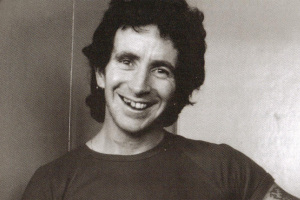 What do you miss most about him?
What do you miss most about him?
Everything. His smile, his wit, his sarcasm, his humor, his lyrics and the incredible ability he had to stay so down to earth and kind to everyone, even though he was a rock and roll singer in one of the greatest bands in the world.
I interviewed Rick Springfield recently and apparently he and Bon were good pals from way back. We were talking about how you never, ever hear one bad thing about Bon Scott.
Rick is right, Bon was one of the sweetest people I’ve ever met. He was always smiling and trying to make you laugh. During our interview in Milwaukee in December of 1977, he kept giving me some really inappropriate answers, which kept the whole band giggling. It was a true honor to have known him and been teased by him. He was a rock and roll sprite. Always a sparkle in his eye.
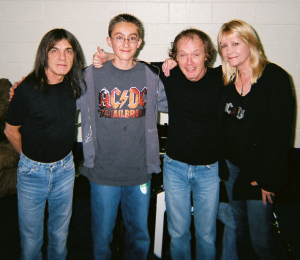 You call the band, “sweet, polite, albeit salty.” It’s amazing that after forty years, you can’t seem to find one story of these guys acting like “rock stars.” They’ve been consistently humble, funny, nice down-to-earth guys who refuse to take themselves too seriously.
You call the band, “sweet, polite, albeit salty.” It’s amazing that after forty years, you can’t seem to find one story of these guys acting like “rock stars.” They’ve been consistently humble, funny, nice down-to-earth guys who refuse to take themselves too seriously.
I think their attitude has had a huge impact on their career. I have met and interviewed dozens of bands over the years and AC/DC stands out for being able to remember where they came from, and staying humble despite their incredible success. They truly care about their fans, and are grateful for them. Their music, the way they handle themselves in their private lives and their sheer ability to laugh at themselves no matter how famous they are, is an extraordinary gift.
Give us a quick favorite “FAQ” tidbit on each member.
Angus – Aside from being an incredible guitar player who is larger than life on stage, is very soft spoken and polite to everyone he meets. He is also an accomplished painter.
Malcolm – Even though he didn’t do the majority of interviews for the band over the years, he was always the one calling the shots and making the business decisions. Malcolm was the genius behind AC/DC.
Cliff – Was so broke at one time he was homeless. Luckily a friend told him that AC/DC was looking for a new bass player, and he got the job. Angus has joked that it had everything to do with his looks, someone to help bring more ladies in.
Phil – While on tour in the early days, Phil always had a large stereo system in his hotel room, and an electric car set to play with. Despite his troubles in the recent past, Phil is not only an accomplished drummer, (one of the best in the world, in my opinion), he also runs his own helicopter company, a recording studio and a popular restaurant.
Brian – For having been in the band for the past 35 years, Brian is so humble he still thinks of himself as the “new guy.” He also owns and races cars, is a gourmand, and has written an opera, produced the band Neurotica, and is so funny that he continually cracks jokes. His accent is so thick that sometimes it’s hard to tell what he’s giggling about though.
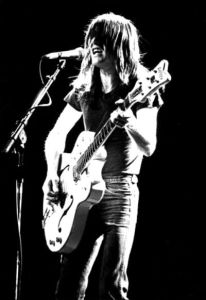 Are you all right speaking about the situation with Mal? Anything you want to say about it.
Are you all right speaking about the situation with Mal? Anything you want to say about it.
While keeping in mind his privacy and the privacy of his family, learning of Malcolm’s health problems was truly heartbreaking. He spent his whole life building the legacy of AC/DC, and the fact that he can’t sit back and enjoy that now is a tragedy. I love the entire band, but I have always had a soft spot in my heart for Mal, because he easily could have forgotten about me long ago. He and Angus have always treated me like family, and I will be forever grateful for that. He is a genius and will remain one of the greatest rhythm guitar players/songwriters/riffmasters in the history of rock and roll.
What makes AC/DC the greatest rock & roll band of all time?
Sticking with their love of true rock and roll with a blues background. They’ve kept it simple, steady, yet retained the ability to still blow you up against the wall 40 years later. Their songs, the riffs, and sheer power to rule a stadium full of people four decades later have earned them that title, hands down.
You can see where AC/DC carry the torch of Chuck Berry and Little Richard – straight ahead, no frills, high energy rock and roll — so why have no other bands come along to fill their shoes in 40 years? Who’s gonna carry the torch once AC/DC hang it up for good?
Your last question says it all. There will only be one AC/DC, and no one can fill their shoes. Much like a painting by Monet, a sculpture by Michelangelo, or a symphony by Mozart, you can be inspired by the greatness, and appreciate the grandeur of it, but you can’t replace it.

